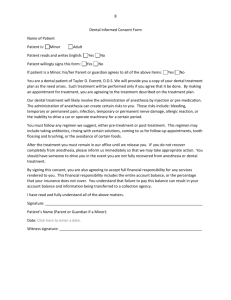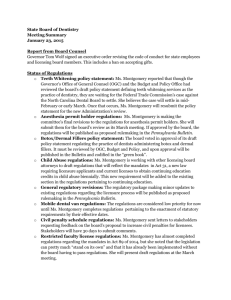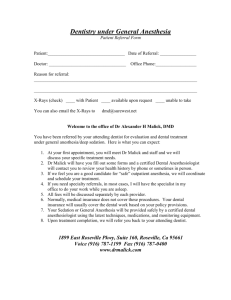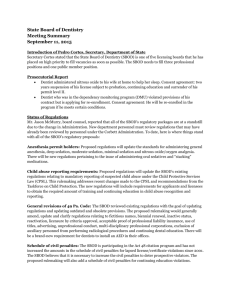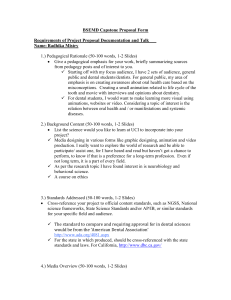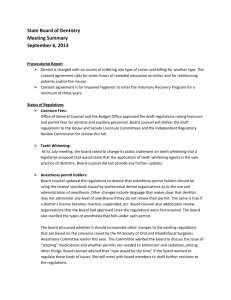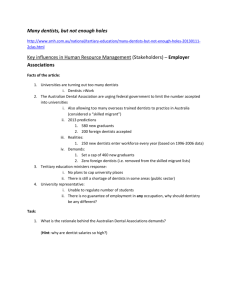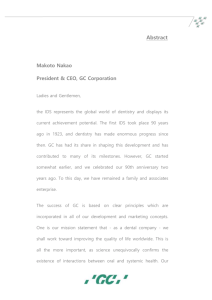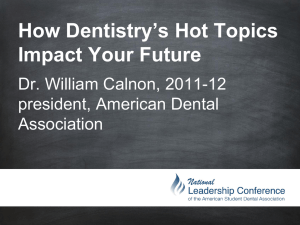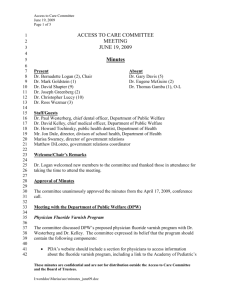July 10, 2015 - padental.org
advertisement
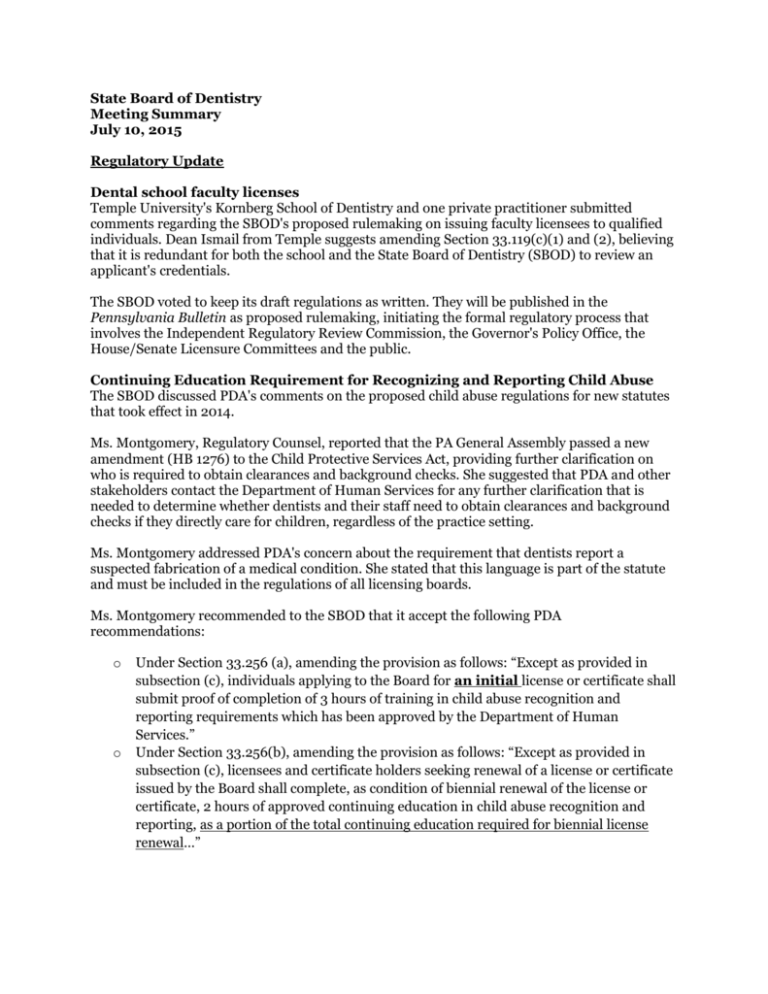
State Board of Dentistry Meeting Summary July 10, 2015 Regulatory Update Dental school faculty licenses Temple University's Kornberg School of Dentistry and one private practitioner submitted comments regarding the SBOD's proposed rulemaking on issuing faculty licensees to qualified individuals. Dean Ismail from Temple suggests amending Section 33.119(c)(1) and (2), believing that it is redundant for both the school and the State Board of Dentistry (SBOD) to review an applicant's credentials. The SBOD voted to keep its draft regulations as written. They will be published in the Pennsylvania Bulletin as proposed rulemaking, initiating the formal regulatory process that involves the Independent Regulatory Review Commission, the Governor's Policy Office, the House/Senate Licensure Committees and the public. Continuing Education Requirement for Recognizing and Reporting Child Abuse The SBOD discussed PDA's comments on the proposed child abuse regulations for new statutes that took effect in 2014. Ms. Montgomery, Regulatory Counsel, reported that the PA General Assembly passed a new amendment (HB 1276) to the Child Protective Services Act, providing further clarification on who is required to obtain clearances and background checks. She suggested that PDA and other stakeholders contact the Department of Human Services for any further clarification that is needed to determine whether dentists and their staff need to obtain clearances and background checks if they directly care for children, regardless of the practice setting. Ms. Montgomery addressed PDA's concern about the requirement that dentists report a suspected fabrication of a medical condition. She stated that this language is part of the statute and must be included in the regulations of all licensing boards. Ms. Montgomery recommended to the SBOD that it accept the following PDA recommendations: o o Under Section 33.256 (a), amending the provision as follows: “Except as provided in subsection (c), individuals applying to the Board for an initial license or certificate shall submit proof of completion of 3 hours of training in child abuse recognition and reporting requirements which has been approved by the Department of Human Services.” Under Section 33.256(b), amending the provision as follows: “Except as provided in subsection (c), licensees and certificate holders seeking renewal of a license or certificate issued by the Board shall complete, as condition of biennial renewal of the license or certificate, 2 hours of approved continuing education in child abuse recognition and reporting, as a portion of the total continuing education required for biennial license renewal…” The SBOD voted in approval of the draft regulations, as amended to include PDA's above suggestions. They will be published as proposed rulemaking in the Pennsylvania Bulletin, initiating the formal regulatory process. Regulations for anesthesia permit holders Ms. Montgomery reported that the SBOD's Anesthesia Committee agreed with the suggestion made by PSOMS' Anesthesia Review Committee that the regulations require dentists to obtain a restricted permit level I in order to administer oral sedatives. There is a particular concern about dentists who "stack" medications. The draft regulations now make explicitly clear that dentists need a permit to do so. Ms. Montgomery addressed PSOMS' concern that dentists may still have an active permit even when they have failed to have the clinical evaluation and office inspection that is required every six years. Because these inspections take place at different times throughout the year, the Anesthesia Review Committee's inspectors have encountered situations in which a permit holder failed to schedule the inspection and evaluation, but his/her permit is still active until the next licensure renewal period. Ms. Montgomery stated that it is impossible to circumvent the Dental Practice Act and regulations as they now read, and that these dentists must be guaranteed their right to due process. The SBOD cannot pull their permit; however, any dentist who is noncompliant with the evaluation and inspection requirement would be subject to disciplinary action. The SBOD's Anesthesia Committee spent a considerable amount of time addressing PSOMS' concerns about certified registered nurse anesthetists (CRNAs) administering anesthesia in dental offices. Because CRNAs are not under the SBOD's jurisdiction, Ms. Montgomery had added a requirement referencing regulations from the State Board of Medicine. However, the Committee was concerned about allowing CRNAs to be supervised remotely by a physician and the confusion that may ensure as to whether the physician or dentist is ultimately responsible. The Committee wants to make clear that the individual held responsible is on the premise the entire time anesthesia is administered and the patient is treated. Physicians must be on site when supervising the CRNAs. The board instructed Ms. Montgomery to eliminate Section 33.340(4.1) on page 14 of the draft regulations. The SBOD approved the draft regulations as amended. They will be published as proposed rulemaking in the Pennsylvania Bulletin, initiating the formal regulatory process. Prosecutorial Division Presentation The SBOD asked representatives from the Prosecutorial Division about who handles the complaints against dentists who allegedly have not provided treatment up to the standard of care. The state's investigators review these cases and conduct interviews and site inspections. Oftentimes they consult with dental experts during the course of the investigation. The state will notify the complainant via letter when a case is closed and prosecute cases in which the dental experts found the dentist provided substandard care. Several SBOD members expressed their belief that dental experts should be used from the very beginning, working with the investigators to determine which cases warrant investigation. The SBOD fears that investigators without any clinical expertise are choosing not to investigate some complaints that warrant further investigation. Several members asked whether a SBOD member could be part of the initial review process. After the representatives explained that Pennsylvania has very restrictive laws that would prohibit such, the SBOD suggested that the state use former SBOD members to work with investigators from the outset. The presentation ended with the SBOD expressing that it would feel more comfortable if someone with dental expertise is involved with reviewing complaints when they are first submitted. The representatives acknowledged this concern but there was no resolution from the discussion. Committee Reports Expanded Function Dental Assistant Committee: No report Licensure Committee: No report Newsletter: No report Practice Ownership Committee: No report Probable Cause Screening Committee: The committee reviewed three cases. Legislative & Regulatory Review Committee: No report Anesthesia Review Committee: No report 2015 Meeting Dates September 11 October 23 December 11
